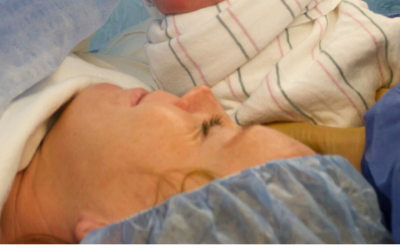
Cause-and-effect relationship between COVID-19 infection during pregnancy and developing preeclampsia
SARS-CoV-2 and the subsequent development of preeclampsia and preterm birth: evidence of a dose-response relationship supporting causality
Early in the COVID-19 pandemic, there were reports of worse COVID-19 disease in pregnant persons compared to non-pregnant persons. As the pandemic continues, we are learning more about the effects of COVID-19 infection during pregnancy on not only the severity of the COVID-19 disease but also pregnancy health too. Researchers for this study asked if COVID-19 infection may cause preeclampsia. To answer research questions about “cause and effect” in research, one scientific approach is to look at dose-response relationships (meaning, if the higher the dose is, the higher the response is- that could support the “dose” causing the “response”). For example, when asking if COVID-19 causes preeclampsia, perhaps a group of patients without any COVID-19 infection during pregnancy would have the lowest occurrence of preeclampsia, pregnant persons who had severe COVID-19 illness would have the highest occurrence of preeclampsia, and then occurrence of preeclampsia in a group with a mild COVID-19 infection would be in-between. This is exactly what researchers in this study did using medical record data from 1,223 patients that had COVID-19 infection during pregnancy across 14 hospitals in the United Kingdom. Researchers classified patients with either asymptomatic, mild, moderate, or severe COVID-19 disease. The study found an increased occurrence of preeclampsia in each of these groups as COVID-19 disease was more severe- with 1.9% of the asymptomatic group having preeclampsia, 2.2% of the mild COVID-19 group having preeclampsia, 5.7% of the moderate group having preeclampsia, and 11.1% of the severe group having preeclampsia.
Take home message: Showing a increasing occurrence of preeclampsia among groups of patients with increasing severity of COVID-19 disease is evidence for a possible cause-and-effect relationship between COVID-19 and preeclampsia. Future research should focus on understanding the possible ways COVID-19 could lead to preeclampsia in pregnant persons.
Link: https://www.ncbi.nlm.nih.gov/pmc/articles/PMC8387567/
Citation: Lai J, Romero R, Tarca AL, Iliodromiti S, Rehal A, Banerjee A, Yu C, Peeva G, Palaniappan V, Tan L, Mehta M, Nicolaides KH. SARS-CoV-2 and the subsequent development of preeclampsia and preterm birth: evidence of a dose-response relationship supporting causality. Am J Obstet Gynecol. 2021 Dec;225(6):689-693.e1. doi: 10.1016/j.ajog.2021.08.020. Epub 2021 Aug 26. PMID: 34454898; PMCID: PMC8387567.
About Research Roundup
Each quarter, our team of researchers reviews the most current studies related to hypertensive disorders of pregnancy and selects those studies they feel will be of greatest interest to our community to summarize.
Special thanks to our volunteer research team, who under the leadership of Dr. Elizabeth Sutton, make Research Roundup possible: Alisse Hauspurg, MD Felicia LeMoine, MD Jenny Sones, PhD, DVM, and Robin Trupp, PhD, RN.
Related Articles

Recent findings in preeclampsia research have shown that preeclampsia likely has at least two variants – an early onset and a late onset variant. Early onset is typically defined as before 34 we...

Preeclampsia is a pregnancy complication marked by new-onset high blood pressure and signs of stress on organs such as the kidneys, liver, and brain. While much attention is often given to preterm dis...

Preeclampsia is a serious problem that can happen during pregnancy. It often affects the brain and can cause headaches, vision problems, strong reflexes, and seizures (called eclampsia). In this study...

Pregnancy offers a unique window into a woman’s future heart and cardiovascular health. Conditions such as hypertensive disorders of pregnancy (HDP) which include gestational hypertension, preec...

Heart disease, also called cardiovascular disease (CVD), is becoming more common in young women across the United States. Hypertensive disorders of pregnancy (HDP) is a group of conditions that includ...

